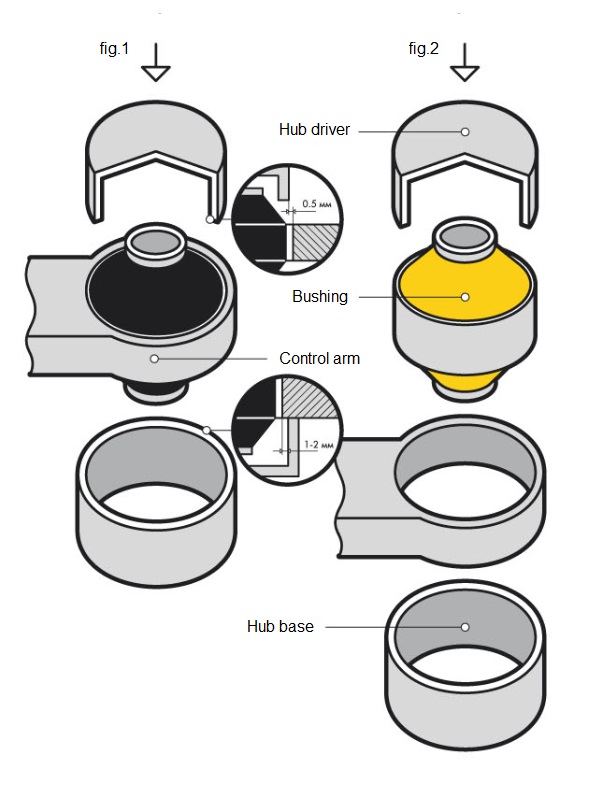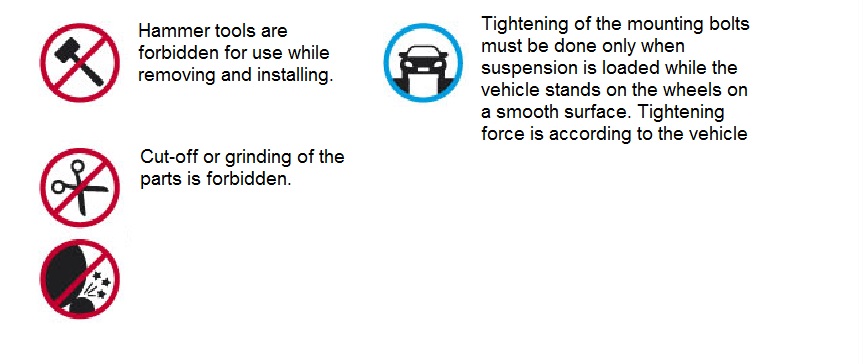Attention! Before starting a work of the removing and installing of the control arm bushings take note of the bushing’s placement. If the placement of the bushing is significant for the proper operation, mark the correct position for the bushing in control arm. If arm has a П-shaped profile, use the strut to avoid deformation while removing and installing the bushings.
Removal
- Choose the metal tubings (hub base and hub driver) for the removal and installation of the bushing. O.D. of the hub driver must be 0,5 mm. less than O.D. of the outer metal shell to avoid damage of the housing bore and control arm deformation. Hub base I.D. must be 1-2 mm. bigger than O.D. of the outer shell not to interfere the removing oа the bushing.
- Place an arm supported by the hub base on a press.
- Place a strut into the arm if it has a П-shaped profile.
- Place a hub driver upon the bushing.
- Press an old bushing out of the arm increasing pressure gradually to avoid a skewness of the hub driver and deformation of the housing bore and control arm.
- After pressing the old bushing out, inspect the surface of the housing bore, clean, file and polish if any dirt, rust, burr.
Installation
- Compare I.D. of the housing bore and O.D. of the bushing’s outer shell. O.D. of the bushing’s outer shell must exceed I.D. of the housing bore 0,2-0,5 mm. Difference in diameters provides required fixation of the bushing in housing bore in a result of the outer shell resiliency. If you do not detect the difference in diameters, ensure the correct bushing or change the control arm.
- If marking of old bushing was done, mark new bushing exactly as dismantled one to provide the correct position of new bushing in the housing bore of the control arm.
- Place a control arm upon the hub base into the press.
- Insert the strut into the П-shaped arm to avoid deformation.
- Place new bushing in a housing bore in marked position.
- Place a hub driver upon the bushing.
- Start pressing. Increase the load gradually to avoid skewness and deformation of the hub driver and bushing. While pressing, take a control over the alignment of the marks on the control arm and new bushing.
- After the new bushing is pressed in, hold the control arm and ensure the correct position of new bushing in the housing bore of the control arm.
Attention! After the bushings replacement, check the wheel alignment.

| Possible problems* *Are not a result of the parts defects and can’t be considered as a warranty case | Inner metal sleeve is torn off. | Outer metal shell is torn off. | Clunk after the installing of bushings with elastomer extending over the inner metal sleeve. | Elastomer part of the bushing is rifted or damaged. | Bushing is not holding in the housing bore. | Control arm bushing with outer metal shell is deformed while installing in the housing bore. |
| Wearout of the stabilizer and / or arm’s housing bores. | X | |||||
| Another parts of suspension are worn out. As a result, the load on bushings is uneven. | X | X | X | |||
| Vehicle was operated in excess of the maximum capacity. | X | X | X | |||
| Inner sleeve of the bushing hasn’t got in mating bracket. | X | |||||
| Outer shell or inner sleeve is not adhered to the elastomer by design specificity. | X | X | ||||
| Vehicle is raised on and suspension geometry is broken. | X | X | X | |||
| Bushing has been trimmed or ground. | X | |||||
| Wrong choice of the bushing (incorrect OEM). | X | X | ||||
| Sharpened edges of the housing bore were not filed and caused a damage of the bushing during installation. | X | X | ||||
| Inappropriate tightening of the parts. | X | X | ||||
| While the new bushing was pressing in, inappropriate hub driver cut the elastomer that has been torn later. | X | |||||
| Bushing was skewed while installing in the housing bore. | X | |||||
| Inappropriate hub driver. Uneven distribution of the press force. | X |


